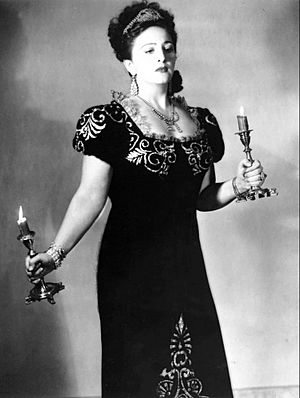Zinka Milanov facts for kids
Quick facts for kids
Zinka Milanov
|
|
|---|---|

Milanov performing in Tosca, 1946
|
|
| Born |
Zinka Kunc
May 17, 1906 Zagreb, Kingdom of Croatia-Slavonia, Austria-Hungary
|
| Died | May 30, 1989 (aged 83) Manhattan, New York City, US
|
| Nationality | Croat |
| Occupation | Opera singer |
| Years active | 1929 - 1989 |
Zinka Milanov (born May 17, 1906 – died May 30, 1989) was a famous Croatian opera singer. She was known as a "dramatic soprano," which means she had a powerful and rich high singing voice. This type of voice is perfect for big, emotional roles in operas. Most of her amazing career was spent singing at the Metropolitan Opera in New York City, one of the world's most famous opera houses.
After finishing her studies in Zagreb, Zinka Milanov had her first performance in 1927. She sang the role of Leonora in Giuseppe Verdi's opera Il Trovatore in Ljubljana, Slovenia. From 1928 to 1936, she was the main soprano at the Croatian National Theatre. In 1937, Milanov sang at the Metropolitan Opera for the first time. She continued to perform there until 1966. She also gave concerts and was a respected voice coach and teacher. Zinka Milanov was the sister of the composer and pianist Božidar Kunc.
Zinka Milanov's Life Story
Zinka was born as Zinka Kunc in Zagreb, Croatia. She learned to sing from great teachers, including the famous opera singer Milka Ternina. She also studied in Milan, Italy, and Berlin, Germany.
On October 29, 1927, when she was 21, Zinka had her first opera performance. She sang the role of Leonora in Verdi's Il Trovatore in Ljubljana, Slovenia. Just five weeks later, she performed in her home country at the National Theatre in Zagreb. There, she sang the role of Marguerite in Charles Gounod's opera Faust.
After an early performance in Dresden, Germany, her teacher, Milka Ternina, felt Zinka needed more practice. So, Zinka spent the next six years performing mostly in Zagreb and Ljubljana. Later, she joined the New German Theatre in Prague, where all the operas were sung in German. A famous conductor named Bruno Walter discovered her talent there. He recommended her to another very famous conductor, Arturo Toscanini, for a performance of Verdi's Requiem in Salzburg, Austria.
Singing at the Metropolitan Opera
In 1937, Zinka Milanov made her debut at the Metropolitan Opera in New York. She sang Leonora again. Around this time, she started using the name Milanov. This was the stage name of her second husband, who was an actor. Zinka felt that "Kunc" wasn't "glamorous" enough for the Metropolitan Opera stage.
In 1940, Milanov was one of the main singers in a radio performance of Beethoven's Missa Solemnis. She sang alongside other great artists like Jussi Bjoerling. Toscanini conducted the NBC Symphony Orchestra for this performance.
In 1947, she left the Met for a short time when she married for the third time. Her husband was Ljubomir Ilić, a general and diplomat from Yugoslavia. She moved back to Yugoslavia. In 1950, she performed at the Teatro alla Scala in Italy, which is another very famous opera house. She sang the role of Tosca. Milanov returned to the Metropolitan Opera later that same year.
She gave her very last performance in 1966. It was on the closing night of the old Metropolitan Opera House. Even while she was still performing, Milanov also worked as a voice teacher. After she retired from singing, she spent all her time teaching. Some of her students became famous singers themselves, including Grace Bumbry and Christa Ludwig.
Zinka Milanov made many recordings from the 1940s to the 1960s. Her voice was perfect for Italian operas by composers like Verdi, Ponchielli, and Puccini. She passed away in Manhattan, New York, on May 30, 1989, at the age of 83, after having a stroke.
Recordings
Zinka Milanov recorded many famous operas. Here are some of her well-known recordings:
- Verdi: Il trovatore (1952)
- Verdi: Aida (1955)
- Mascagni: Cavalleria rusticana (1953)
- Puccini: Tosca (1957)
- Verdi: La forza del destino (1958)
- Ponchielli: La Gioconda (1957)
See also
 In Spanish: Zinka Milanov para niños
In Spanish: Zinka Milanov para niños
 | James Van Der Zee |
 | Alma Thomas |
 | Ellis Wilson |
 | Margaret Taylor-Burroughs |

